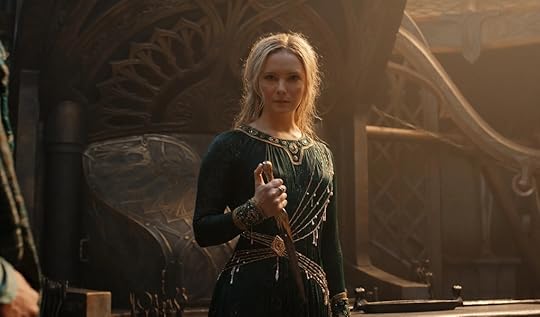Teodor Reljic's Blog
August 31, 2025
edict
after ‘The Western Wind’ by Samantha Harvey
The moon was made to mush and I poured it into the bowl and added water and stirred with my grandmother’s wooden spoon and I worried it would break, crack against the thick glop that refused to budge until I stirred and stirred harder, working against my fear of breaking until it rewarded me with an uninterrupted swirl.
The moon gave in to its new liquid shape and I was glad to have finally done something, anything.
The room in the tower with the wooden table the wooden cups tucked into carved holes made snug to fit. I hear that the other villages have tables of marble but, no matter.
The three baby giraffes had the cups to their chins. The table was high, at least on this it was enough – made just right to allow them to sit and drink without straining and distending.
It would have been something to witness them drinking the mixture in. I poured the moon from the bowl and into the three wooden cups with my backs to the baby giraffes. I imagined their eager, liquid eyes. Blackness, but not of night. The blackness of early innocence. Enveloping, pure.
Another source of pride, and I stung to resist it. The pride: pouring the moon so neatly into the cups that an equal gap was left up top. The rare, brief elegances. But this was not mine. This is where I was drawn, and I merely followed.
I set the cups down onto the gaps and now, at least, I could look. They did not look at me – they were too eager for their meal. But in this eagerness I found gratitude, and I held it warm to my chest. The warmth turned into the remembered words of the Edict: “You are to pour, the rest is theirs. You are to then turn and walk away. They will only flower in your absence.”
It was not in me to break edicts, least of all this one. So I allowed myself this one small thing, this one last thing: to look upon the giraffes as they drank the moon with a total abandon. The abandon of rest. The marker and promise at the end of my mission. All that makes edicts and towers necessary.
I took the spiral staircase and when I opened the wooden door that released me from the tower, I looked up to the moonless black sky and thought about the consuming gardens to come.
July 8, 2025
We Are the Hollow Men | The Bear – Season 4 (Christopher Storer et al, 2025)
“I don’t know what I’m like”.
Carmy’s confession in the final episode of the fourth season of ‘The Bear’ is an existential wrecking ball, all the more so because by now, loyal viewers can easily – nay, with the glistening, wretched smoothness of tragic inevitability – chart the origin of that realisation.
A clenched man who has willed himself into a new persona that is all about end result, all about proving yourself at every turn… the embodiment of the truism that ‘you’re only as good as your last [project]’.
Of course you don’t know what you’re like, you dumb fuck – you never even considered that you could be you. That you could be *a* you to begin with.
In Carmy’s case, the the surface story-metaphor and plot engine is of course tied into him being a superstar chef – a career-rung he only managed to climb after accumulating a fresh barrage of abuse to complement the legacy-pain he suffered under the auspices of his volatile alcoholic mother.
But like any good metaphor, it is not there to exclude and close off but to include anyone willing and keen enough to pay good attention to what’s going on.
Showrunner Christopher Storer must have made Robert McKee proud, whether he knows it or not or whether he likes it or not. I’m referring to one of my favourite takeaways from McKee’s ‘Story’, in which McKee is actually channelling someone else – I forget who it is, and I actually think it’s one of those bona fide lines whose original utterer has long since been lost to memory, and it’s now become community property – and it’s this:
“If the scene’s about what it’s about, you’re in deep shit.”
Of course The Bear isn’t ‘just’ about cooking. Of course it’s not ‘just’ about the travails of running a catering establishment (or two) in downtown Chicago.
But Carmy’s mistake is assuming that life can in fact be just that. That if life becomes limited to ‘just’ that one thing, everything will be okay. After all, this is a form of self-annihilation that he can easily justify and perpetuate because it has the potential to create joy for others. Who doesn’t love good food? And the community feeling of a restaurant – HIS restaurant – clearly justifies him erasing everything else by that. He’s performing a service. Nay, he’s a martyr.
Until the cracks start to show. Until we realise about how his ego is running things to the ground. An addiction to excellence is just another addiction after all, and you chase the high in ever more elaborate ways. In Carmy’s case, this becomes manifested in him changing the menu every night to accommodate a twisted idea of greatness and abundance, draining both his staff and the restaurant’s already-on-thin ice resources.

That is the hypnotic fallacy that looms large over many a quest for ‘greatness’ in any given field, when it’s employed as a tool of evasion by damaged men (and let’s face it, it’s mostly men who are afflicted by this because it’s mostly men who get access to this arena – see Sydney’s journey in The Bear itself as a useful bit of contrast).
“If I break through an undeniable barrier of greatness all of my previous problems and traumas will become irrelevant because I will have ascended a higher plane, where I will be impermeable and indestructible, and the thought of my mother driving her car through the living room won’t ever bother me again, ever. It’s like that. Trust me, it’s like that. It will be like that. Believe, just believe.”
But Carmy doesn’t want to become a god. What he really wants – what he really needs – is to become a real boy. He’s a Pinocchio with no Gepetto and no fairy and no Jiminy Cricket. (The Whale is the Bear is the bear is the bear…).
And so much of Hollywood is ostensibly about this. So much of our mainstream storytelling pays lip service to an idea of what “just be yourself” means. ‘The Bear’ even risked having its version of the manic pixie dream girl in Molly Gordon’s Claire (she even had a cutesy nickname: Claire-Bear!) but luckily that trope was swerved into an opposite pathway and in so many ways, it could only ever be that way: who could possibly be more manic than the Berzatto’s anyway?
But Carmy is so divorced from an idea of a foundational self that even the mere idea feels ungraspable. Jeremy Allen White’s glassy, thousand-yard stare isn’t a placid, contemplative mode – he’s reaching deeper and deeper into a vast nothingness.
All of his motions are the repetitive striving of a crazed phantom. He has no access to generative movement, growth and interaction and so settles into what he knows and just runs in place.
If only his food production were a ritual. It is a ritual, or it could be. If only the running in place were the ecstatic dancing of an indigenous tribe calling forth rain, a good crop… anything that would serve the wider community.
But instead, it’s a stomping down to silence another tattoo. A beat whose sole aim is to stomp on the mere notion that you are a person at all.
Here we go round the prickly pear
Prickly pear prickly pear
Here we go round the prickly pear
At five o’clock in the morning.
June 29, 2025
Hard-Won Agency: Hot Milk (Deborah Levy, 2016; Rebecca Lenkienwicz, 2025)
We all begin from a place of idiocy when tackling family trauma.
This is largely because very few of us can hit the ‘pause’ button on life and explore our damage at our leisure, taking our time with our healing journey and tending to each scar with the requisite care and tenderness.
Like death, trauma is one of the few instances of the ungraspable numinous we still encounter at an alarmingly regular rate in our otherwise secularised existence; it’s slippery and hard to categorise, and you cannot pin it down and name it like Adam was instructed to do when first placed on earth.
And even though we’re popularly guided to apply a cause-and-effect template to trauma (‘I am like this because X happened to me when I was young’), the ghostly after-effects will still linger, and will not be sucked into ectoplasm boxes any time soon. So we can’t analyse. We can’t sit down to calmly pore over things. Still babes in the woods. Still dumb to what came before and what will come next.
Which is why I appreciated Deborah Levy’s Hot Milk: a wry, caustic treatment of trauma and how it seeps down into a mother-daughter relationship, zooming in particularly at a volatile time in both Rose (mother) and Sofia’s (daughter) lives, during which they arguably attempt to undertake what I’ve described above: hitting pause on life so that Rose – but only Rose – may finally heal her ailment (inability to walk) for good.
***
The mixed reception to both the novel – I get a feeling that most people viewed its Booker Prize shortlisting as a perfunctory gesture, riding on Levy’s reputation – and now Rebecca Lenkienwicz’s film adaptation is likely down to a number of factors.
Characters rendered in oblique psychological brush strokes – at times incomplete at best, insufferable at worst. A loaded narrative proposition which never tips into melodrama but offers us little by way of conventional catharsis either. The dangling promise of a queer sub-plot which in the end makes no attempt to say anything politically significant about such an arrangement…
And so on.
I do agree that the novel is somewhat slight, and that other writers would have perhaps filled out the story with a more generous well-spring of empathy towards our characters, particularly the leading female triumvirate that leads the show: Sofia, Rose and Ingrid – the enigmatic, bandana-sporting seamstress who, in the film, appears to Sofia like valkyric vision: astride a horse on the hot Spanish beach: unlikely, unpredictable and ultimately, affected to a fault and hardly the safety raft Sofia needs. But we should all learn to take work on its own terms, and the gaps that both Levy and Lenkienwicz leave out are spaces where discomfort and tension is allowed to grow.
It’s the same tension that grows mushroom-like out of the idiocy of our own thwarted attempts at understanding just what’s wrong with us.
***
Rose has been paraplegic for as long as her aspiring anthropologist daughter can remember, and when we meet them they have temporarily relocated to Almería from London to pursue a last-ditch attempt at treating this ailment for good: enlisting the costly and unconventional services of Dr Gomez, whose methods have more in common with a version of talk therapy than anything resembling a hard medical approach.
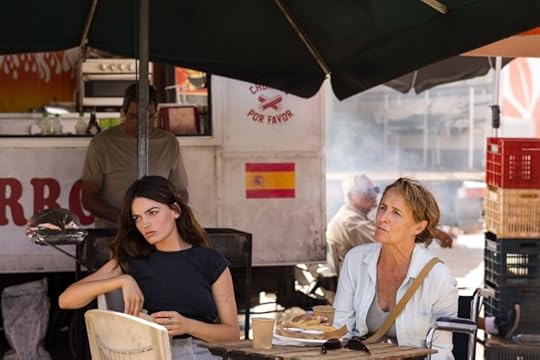
Sofia is her mother’s keeper, and has been for a long time. (Her Greek father Christos is out the picture – having flown the coop back to Athens years ago; he now has a baby daughter by his “child bride”). She is prematurely bitter as a result, and her training as an anthropologist only serves to widen the scope of her pain. Crucially, however, this default mode – the paralysing cycle of familial duty and a stalled approach to her academic development – leads to no breakthroughs.
It’s a recipe for an endlessly deferred existence; a purgatory made even more deeply manifest by their stay at the scorching Spanish seaside. Because Rose isn’t keen on solutions either – Lenkienwicz adds a ghost of trauma to keep the clock ticking there too – and finds comfort in endless deferral.
Which is where the matter of tackling trauma by employing agency gets particularly tricky.
***
The most significant coup of the film adaptation is arguably its casting. For all that Emma Mackey supposedly came in late in the day – our screening in Malta was happily accompanied by a surprise Q&A from the film’s co-producer, Christine Langan, who revealed as much – there is something inevitable to the Sex Education star flexing her dramatic muscles here: effectively, she builds on the easy charm of that show by depicting another sensitive and intellectually curious young woman in, however, a far more sombre and mercurial key.
Fiona Shaw makes for an equally obvious fit for Rose: the veteran actress knows her way around that toxic mix of haughty entitlement and whiny dependence and understands that it’s part and parcel of how she wields her power over her daughter.
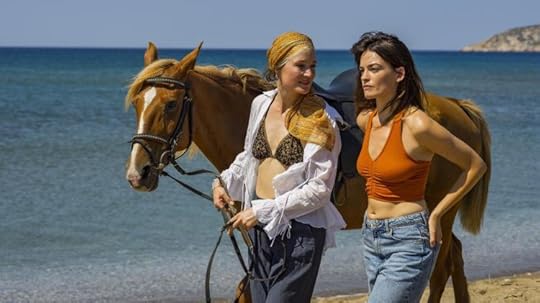
And I’d be hard-pressed to imagine anyone other than the prolific and dependably luminous Vicky Krieps in the role of Ingrid. Sofia is swept along, and so are we. At least we are at first, until her accumulated deceptions – and the underbelly which animates them – chip away at the implication that she is here to create a welcome oasis of bliss for Sofia.
On this subject, I also have a bone to pick with some of the ripples emerging from the critical consensus on the film, both in mainstream publications and online commentary, namely that Ingrid is yet another example of a ‘manic pixie dream girl’ trope.
In many ways, she is. And that is precisely the point. Ingrid is clearly someone who has internalised, and weaponised, her status as something that could be construed as a real-life manic pixie. But as the story progresses, we see that crumble right before our eyes, and we follow Sofia closely on that journey of realisation.
Like Rose, Ingrid shapes her entire identity around her inability to cope with the defining traumatic incident of her life. She knows it happened and what it implies, but she’s either unable or unwilling to process it, so she gilds and embellishes a persona out of the elisions and deviations she takes to avoid confronting things head on (her being a seamstress feels apt, here).
In the middle of it all is Sofia – whose coping mechanism is neither aggressive self-pity (Rose) or promiscuous hedonism (Ingrid) but repression. In this way, she becomes the perfect bedrock on which both Rose and Ingrid can vent their fears, desires and complaints, assuming that Sofia will stick around to absorb it all.
In fact, Sofia’s troubled and troubling pursuit of agency is the true ticking clock of the narrative, and it’s a strand that resonates deeply, particularly with those among us who have been forced to become parents to their own from a young age.
***
You could say that my parents were a mix of both Rose and Ingrid. Charmingly bohemian and easy to love among the social circle they frequented, they were also inept at managing their own emotional landscapes and taking the temperature of their kids’ true needs. Ridiculously young immigrant parents going at it alone with only nominal support (and at a long distance) from the extended family, and relying on badly-managed improv and reheated cliches to ensure we somehow stayed alive.
It’s no wonder that they took any complaint as an affront. That keeping the peace was top priority. We all took pride in not shouting, even if a good row would’ve released energy that would remain suppressed, set to do poisonous damage many years down the line.
Following a stroke, my mother was left in a coma for ten years; the stroke occurred just a few months before my own father suffered his first, which he survived, only to suffer a fatal one a decade and a bit later… largely the result of unheeded medical advice and the same, Rose-adjacent refusal to comprehend that eternal passivity and dependence on others cannot be a permanent life goal.
As such, I very much identify with Sofia’s default setting: keeping the peace by keeping mum. I felt the ripples of damage her repression causes, and I sympathised with her falling for Ingrid: this is an image of who you want to be – a free spirit; ironically, in my case, the same projection of bohemian freedom modelled by my parents in life.
Watching Hot Milk in 2025, after the fallout of losing both my parents, I’m beginning to understand why I’ve always been drawn to coming-of-age stories, of which this is a finely wrought and arthouse ready reminder (none of the tropey, self-help-booky Hollywood takes on that sub-genre here). I found kindred spirits in these retreating protagonists, but also the hope of some kind of release when they finally gain the confidence to break out of the vicious cycle which defines them.
In a weird way, this is aspirational fiction for me. And Sofia’s small wins – working up the courage to steal a fish from the market; liberating a noisy neighbours’ dog from its cruel confinement atop a sun-baked rooftop – feel as they are presented: welcome irruptions of healthy transgression, the promise that you can change things around.
That agency is more than just a myth.
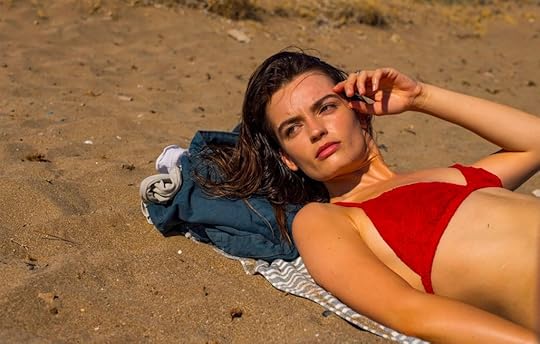
May 24, 2025
Divide and Conquer: Sinners (Ryan Coogler, 2025)
SPOILERS all the way. I’m not kidding. Consider yourself duly warned.
The vampires in Sinners do not represent white supermacy per se. At least, not in a definitive form, insofar as vampires CAN be definitive metaphors of any kind.
Because white supremacy doesn’t need supernatural gilding to appear menacing, devouring and oppressive, even in a genre exercise like Ryan Coogler’s triumphant and moreish exercise in genre – blending Jim Crow-era realism with the baroque stylings of an action-horror romp. The covert Klansmen implanted at the periphery of the film, and whose role culminates in the latter half of the third act, embody the most prosaic kind of evil imaginable. But this doesn’t make them any less of a threat. If anything, they have one advantage over the nocturnal bloodsuckers – they can roam freely over any territory both day and night, invited or otherwise.
No, the vampires here – at least their leader, Remmick (Jack O’Connell) – are simply the manifestation of yet another fallout of systemic oppression. Remmick is of Irish origin and speaks to the suppression of the magical power of his own region’s folk music by the imperialist lurch of both Christianity and the English.
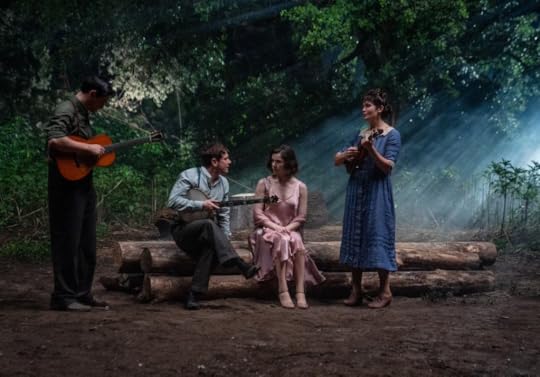
And for sure, a white man wanting to assimilate and fold blues musicians into his ‘rainbow coalition’ project that would seek to upend mundane oppressions with a new vampiric world order does also speak to another layer of exploitation faced by our black protagonists.
But what’s also interesting here is that it’s Remmick who is given the role of ‘too-radical villain’ who may have “a point” but whom nobody in their right minds would follow to the end. Compare this to Coogler’s mainstream breakthrough, Black Panther. In it, we have Killmonger, played by Sinners’ own Michael B. Jordan, who responds to bigotry in kind, but whose actions ultimately have to be dialed up to an unjustifiable extreme for Marvel’s status quo to be maintained.
Sinners never allows for such a boring return to old tropes. Nobody is a saint here, for sure, barring perhaps young Sammie (Miles Caton), but only because this is something of a coming-of-age story for the musically gifted preacher’s son, whom the ordeal leaves “wiser and sadder” and allows him to gradually make a life for himself as a musician further down the line (transforming into Buddy Guy, no less in a mid-credits flash-forward sequence).
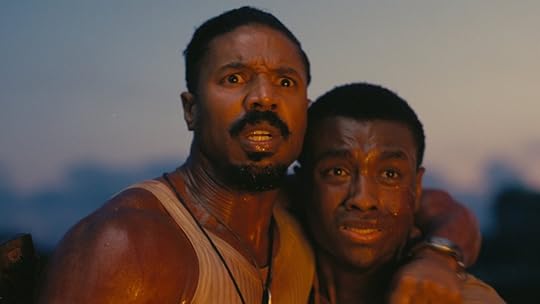
Though hardly the ‘alpha’ of the story, Sammie is the hero here because he manages to slink out of the oppressive binaries imposed by his world. He rejects his father’s pious cocoon, but he also grows out of wanting to be like his cousins – Jordan’s twins Smoke and Stack, whose return to their hometown after a stint with Capone in Chicago kicks the whole shebang into being.
But the undercurrent of sadness that we still feel envelop Sammie at the end – which Smoke warned him about, and which animates the spirit of blues either way – is, I think, down to the loss of the rhapsodic community spirit that we glimpse for a brief, glorious moment when the Twins’ project appears to be succeeding in what it’s trying to do – a sequence in which Sammie’s public debut as a musician ushers forth a wall of sound that pulls in musicians from past, present and future; a chorus which busts open the gates of perception and plucks at one of the animating chords of the universe.
But instead, we find him playing to appreciative but fragmented audiences in a cosmopolitan jazz bar in the big city.
White supremacy has allowed for neither the black community to exist and thrive in peace, much in the same way it crushed the pre-Christian Irish communities attuned to a sense of the numinous that would likely be branded heretic at the drop of a Pope’s hat.
It leaves us scrambling for scraps, and we’re often left scrambling alone.
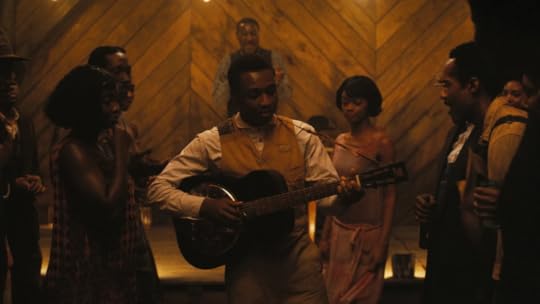
March 20, 2025
Haunted Out of Life | Perfection by Vincenzo Latronico
The central couple of Vincenzo Latronico’s fourth novel Perfection –– translated into English by Sophie Hughes and published by Fitzcarraldo Editions — are living the digital nomad dream c. 2015 when we first meet them: crafting brand identities, catalogues and interfaces for trendy businesses, having successfully uprooted themselves from an unspecified Southern European country of origin to build a new life in Berlin.
That much of the novel centres on their outward success – which only appears to require minor upkeep — is the key to its own triumph as an insidious but blistering satire of the white, middle class and now variously mobile zeitgeist.
Novels like Perfection are judgemental rather than satirical in the broader and more creatively energetic interpretation of that genre, but it’s Latronico’s unsentimental sharpness that makes it into something more than just a pained litany of complaints against a generalised — and generational — mass of people, one so keen for individualised gratification that they come out on the other end of that equation.

Anna and Tom are so thoroughly homogenised in their curated desires that Latronico almost always refers to them as a collective unit. The rare moments where this device is broken are also rare moments of rupture for the couple, but which scan as a relief for us. Could this be the point where some genuine self-awareness can creep in? Or at the very least, a shifting of gears, a recalibration?
The recalibration does come, as it happens, but it only results in more of the same. A relocation from Berlin — never fully a committed separation, more of a sabbatical — for more of the same in Lisbon, or Sicily. There is a parasitic dimension to these movements… which has of course become something of a truism in discussions around the phenomenon of 21st century gentrification. This is probably among the more caustic of Latronico’s landmines, cousins and variants of which are dotted all throughout the short, sharp sliver of a novel: the idea that Anna and Tom’s actual job is to serve as worker-ants in an ongoing gentrification project, all the while believing they are in fact agents of an unprecedented form of self-actualisation.
Their labour alienation reaches an apex that previous generations were at least spared from dreading: they are alienated from work they’re not even aware they’re engaged in executing. (Latronico shrewdly articulates the couple’s own arm’s length awareness of gentrification: they respond to it much in the same way that an unrepentant smoker shrugs off the threat of cancer, and anyway — the true gentrifiers are never themselves, but faceless others).
Latronico’s minimalism doesn’t allow for interiority, but this is what lends the novel its merciless hammer-drop. The whole novel essentially one long arc of a braining hammer, so it’s a mercy that it’s so short, lest byways of specificity and complexity upend its ‘perfect’ arc. We may wish for Anna and Tom to be rendered with more psychological complexity. Indeed, experiencing them as separate human beings would be a decent enough start.
But psychological realism would run the risk of scuppering the social, and cultural realism that Latronico is going for here. There are numerous ways in which either Anna or Tom would be able to justify their lifestyle and its attendant ambitions through psychological byways, through reappropriated therapy-speak… because the neoliberal status quo has made a bedfellow out of all this, the closest equivalent we have to a spiritual resting point.
So in choosing to merely observe their motions through spare, unsentimental prose, we see just how oblivious their drive is; how the constant push towards the comforts of good taste for its own sake merely leads to hollow replication — an addiction whose cure can be indefinitely deferred because its damage is not so readily apparent.
This is how we are haunted out of life.
*
Reading Perfection brought to mind the Gen X variant of the ‘state of our time’ novels that I’d devour in my late teens and early twenties: choice cuts from Douglas Coupland, Bret Easton Ellis, Chuck Palahniuk, Irvine Welsh and the like. These writers were either hailed or reviled as often-gratuitous purveyors of their generation’s excesses: rubbing our faces in its nihilism and emptiness for the sheer sadistic — if not subversive — thrill of doing so.
But there was an undercurrent to my reading that I felt but never quite confronted, but I’m ready to confront it now because Perfection brought it bubbling back up and, I guess, I find myself in a less insecure space than that jittering post-teen used to occupy while thumbing through these books in between breaks and on buses while attending Sixth Form.
This is a deeply moral work. If not a spiritual one.
The hollowness it depicts is also a call to action. Of course, articulating it as such would break the spell of the shimmering, sharp minimalism of the work — would introduce that crucial element of earnest humanity into what is otherwise a mini-opus of ‘perfect’ cynicism.
But that is precisely how Latronico — and the previous writers I’ve mentioned, at their best — operates.
The status quo wants us to believe that Anna and Tom are the ultimate aspirational figures. Latronico spends upwards of 100 pages convincingly arguing otherwise.
February 20, 2025
What we talk about when we talk about home
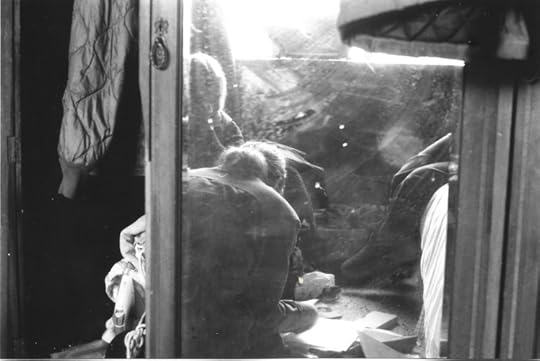
Is there a standard expectation of when our earliest memory is expected to be? The image I have in mind feels a bit late in the day – I was six or seven years old – but I can’t grasp for anything earlier with any conviction and anyway, the further down you go the risk of low-key hallucination – our own personal storehouse of fiction – increases exponentially.
We left Serbia for Malta when I was seven years old, and we spent some days in Bulgaria en route to the island, because wartime sanctions meant we couldn’t fly out directly and had to make a pitstop to Sofia, taking a train ride from Belgrade and sleeping over at the home of acquaintances I hadn’t heard about before or since.
I do remember parts of Sofia – a large, Communist-style statue of a male figure seeping through the urban sprawl, a vegetable market, the brutalist buildings that weren’t all that different from Belgrade – and I remember the train ride too: though the sequence and the images aren’t that clear, my maternal grandmother’s sorrow and confusion still lands like a fresh arrow.
But these weren’t the very first memories – hazy and ancient though they feel too, like watching a grainy film of somebody else’s life, lost in archival wreckage and only just about salvagable, albeit in fragmented form.
The first memory was a foreshortened view of my mother – stylishly dressed as she always was, but definitely dressed to go out, with a coat and a hat and everything, and a wide, warm smile that was to become an aching pull of charm to whoever would meet her.
“We’re going to go find dad.”
She was foreshortened because I was sleeping on the top bunk of our bed in Zemun, with my four-year-old brother on the lower one. The mood of her smile suddenly matched my own – it spread out to me like an infectious carrier of pure joy.
Finding dad was the one thing I wanted. The one thing I felt was missing. The wistfulness for him that had become my norm by then was finally going to find its culmination, was finally going to be allowed to die a natural death.
So that I could become me, in whatever was left.
Dad wasn’t around for a bit because before the Malta plan, there was the Libya plan. The creep of the Yugoslav Wars – that one blip in the otherwise end-of-history-ish vibe that permeated the West during the ’90s – had nudged our parents into considering other options.
And the one that made itself readily available was this one: my father would go to work for his uncle at the drydocks of Benghazi, and the first stage of that was an exploratory trip away from us for some months.
The surge of instant gladness I still remember feeling the moment my mother smiled up at me to say we’re going to find dad means that I had felt his absence like the undeniable cavity of a freshly pulled out tooth.
There’s something that invokes self-pity in the idea that a lack was a main characteristic of my psychic development at that time, but there’s also a positive flip-side to this early memory being tinged with relief and expectation. It’s also a confirmation of the kind of bond you develop with a parent so early on – they really are at the center of your world, so their absence feels, at the very least, like a key comfort denied.
Now my parents are both dead. What to do when that absence becomes not just deferred, but extended indefinitely?
The more time passes, the more I realise just how much of that initial childish separation from my father conditioned my emotional space.
It made me all the more keenly susceptible to nostalgia, to the point where people would make fun of me for wallowing in it at such a young age. (“You’re seventeen, what could you possibly be nostalgic about?”).
Because my parents were either incapable, or unwilling, to internalise the value of sitting still. Displaced from Serbia, we moved within Malta too, just about enough to fully rattle my young psyche into believing that I’ll never find a true sense of home. It’ll surprise precisely no-one that the upshot of this was a dovetailing into fantasy by default.
During break-time at at school, I was magnetically drawn towards the areas of the playground market ‘out of bounds’ – signs virtually unenforced by whatever passed for gatekeeping authorities – lax at the best of times – and which were certainly not going to clamp down on the gawky, floppy-haired nerd who did little except munch of a soggy sandwich and stare into space.
Nostalgia and fantasy walk hand in hand. This is why nostalgia is more than just dry record or a verifiable memory. This is why it comes with a charge of desire and wistfulness, and consequently also why it tends to be viewed with suspicion. Unhealthy, neurotic, escapist and regressive. Putting people inside hamster-cage loops of the past that are both ghostly and undeniable.
This is all well and good. It is the rational position to take. It is the sober and constructive approach that discourages needless and ultimately damaging wallowing. Being lost in the past means being placed in a state of arrested development. Nostalgia means being plunged back into the past, but time as we live it moves forward, and a lot of our psychic success hinges
on at least meeting it halfway.
But that implies that a ground of some kind exists. A home base – indeed, a home, period.
But what if your home never quite materialised? And what if this tenuous home is a rock in the middle of the sea that is constantly made to evolve according to the whims of its colonising forces – both imperial and capitalist?
II.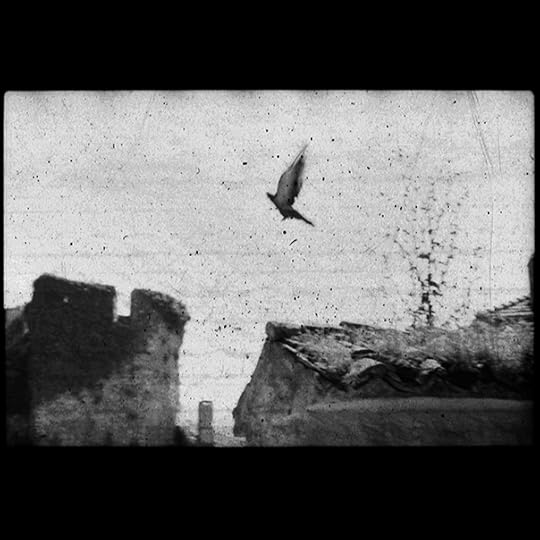
Both my parents are now dead, and of course I have plenty of regrets and unasked questions which will forever remain pending in a rotting pigeon-box; snuck in but unopened, and I’ll soon forget the actual articulation of these questions and everything will join the same ghostly realm of the nostalgic miasma that I’m straining to pin down and describe here.
As we’ve said – time moves forward, and this forward motion also implies the scalding away of the bodies of those who gave you life and who – inadvertently or otherwise – shaped your social and emotional expectations. But these expectations are never perfect, and often in fact emerge from a build-up of keen and unique damage: unprocessed and even barely addressed.
You know all this. We know all this. But the forward churn of time often leaves these scars lodged into our bodies while we’re forced to tend to other, fresh ones. To put out new fires while older ones are still raging, though some may be reduced to a slow, keen sputter that has morphed into a fireplace of sorts.
I’m overreaching with these metaphors, maybe. I’m just sculpting verbal play from immediate impressions, in the hopes that it would yield something useful. But in the end, isn’t that what all writing is? Isn’t that what the essay form is in particular – to assay, to try, to learn as you go along.
Besides, I like the old-flames-as-new-fireplace metaphor. I think it speaks to the tendency of ‘legacy-trauma’ becoming a default state. Something to return to. A toxic form of comfort. Stories we tell to root ourselves into a sense of coherence, if nothing else.
One of these fireside conversations could concern the details of my father’s time in Libya. He was there around 1991 and 1992 – it had to be around the first half of that time period because by July of 1992 we had already ‘settled’ into Malta with the same provisional air that would inform pretty much everything else we would do as a family.
He was meant to work at the drydocks there, but that plan obviously did not work out because we ended up starting a new life in Malta instead. (There would’ve been something divinely ironic though, wouldn’t there, in going from one country with an authoritarian wartime crisis that devolved into civil war, only to find ourselves in another further down the line).
The fireside story is that he was given a reprieve from whatever hands-on work he was expected to do and he was sent to ‘deliver documents’ to people in Malta. He never got too specific about either. And I never really felt the need to ask, for some strange reason. It’s not so much that I feared the answer would yield something suspicious or unsavory. It’s just that at the time, I took his word for it. I guess we all did. It’s just the kind of thing you allow dads, I suppose, because you want to submit to that imperative – to believe they are the ones providing you with that stable bedrock from which all other meaning emerges and grows.
The fireside story isn’t so much about what he did and didn’t do there, exactly. For that, I suppose there’s both the prosaic and the spurious – if not romantic – interpretations available to us to bandy about.
He could’ve just decided it wasn’t for him – any by extension, per the aforementioned patriarchal imperative, not for us – and that he made a judgement call and opted for the post-colonially wrecked but pretty Mediterranean island instead. Then we could of course run riot with the poundshop espionage narratives, the lurid conspiracy theories: ‘delivering documents’ from Libya to Malta at the peak of the Gaddafi regime? Juicy. Le Carre worthy. Even ‘sus’.
(Later, much later, as my brother and I would bond over his many faults and wounds after his death, he’d offer a plausible stitch to the story: our artsy father was ‘useless at actual construction work’ and so his uncle found some use for him as an messenger boy).
But funnily enough, the fireside story doesn’t amount to a culmination of any of the above. It concerns an even more finely-tuned and concise piece of storytelling. One that frames our tale of settling into Malta as both sanguine and inevitable.
“My dad went to work in Libya, he didn’t really like it, so he took a Captain Morgan boat to Malta to scope out the island and once there he said, this is good – we’ll settle here.”
An elevator pitch. Free of needless detail and complication. Emboldened with pure immigrant pluck, and animated by hope.
Just like we never questioned the details of my father’s time in Libya, so my family never picked all that much at the thorny matter of the Yugoslav Wars, at least not in any incantatory way that would cohere a united front – those micro-political stances some families do take on major issues like these. It’s not that the subject was taboo – my parents spoke about it among themselves in our presence, openly discussing it with fellow Yugo-expats while trying to condense it into bite-sized chunks for Maltese acquaintances – but there was a sense in which talking about it at length with the kids meant infecting the family with its oozing ugliness.
There were some tableside scraps of the narrative which were easy to internalise, though: such as the prevailing thought that the very premise of the war was absurd, that the internecine divisions which characterise it were arbitrary and that nationalistic impulses in whichever direction were enabled by a lumpen mass of the uneducated.
But on a day-to-day level, the war only registered in the undeniable fact of our displacement, and our ongoing distance from the home country as it all raged at its worst and sanctions still barred us from traveling.
So that we lived in that absurdist limbo state where Bryan Adams’s ‘Everything I Do (I Do it for You)’ – ubiquitous as the equally incorrigible camp-fest that was Robin Hood: Price of Thieves to which it was wended as the banner theme song – edged itself into our lives in a more significant way than the contemporaneous Battle of Vukovar never could. Similarly, when we finally got to return to Serbia in 1996, the main emotional undercurrent was that we got to introduce my sister – born a year prior – to our grandparents… us kids were oblivious to the fact that the Dayton Agreement is really what made the trip possible.
‘The war’ was just a perpetual hum in the background of our lives: an undeniable state whose particulars, however, were always remote for us in the immediate sense.
I suppose this is the privilege of those like us who made their way out. (Not to mention the position of Serbia in particular, when it came to its role in the conflict itself).
But there are so many remainders and loose ends. No real narratives, only impressions. And I suppose that, when it comes to war, this is all for the better: we know that concrete narratives in these scenarios often breed monstrous things.
But for a child, the space of silence is rarely a cocoon for meditation. More often than not, it becomes an incubator for loneliness.
III.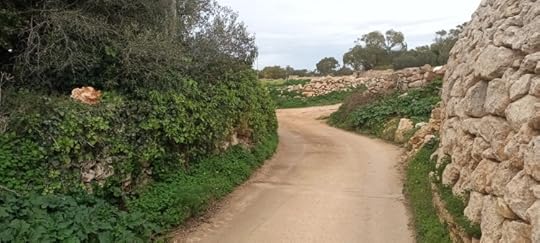
The space of loneliness is of course different from that of solitude – with the latter assuming the mantle of the heightened position, the zen-like placid calm and an easy self-communion – but when you’re a kid and experimenting with the things that make you feel good and ease the pain you don’t yet have the layers of experience, of trial-and-error to really make the distinction.
I’ve spoken a lot about the in-the-moment dynamics of displacement and migration here, and loneliness – crucially, not solitude – was a big part of it for me from the beginning since there was very little to latch onto or even land on.
This is what I’ve always found funny about Malta. That the rock is totally a rock. Its undeniable state as an island predominantly defined by rock and STONE – largely the flaky-soft limestone, but still. Famous for it Neolithic temples and famous for all the subsequent temples that followed – one church for each day of the year, St John’s Co-Cathedral and Ta’ Pinu Basilica and all the rest of it. The winding country roads defined by handmade cobbled walls – precarious as they are ubiquitous, a trademark to be protected and which will determine the island’s definition for what feels like forever.
And even down underground, from the paleo-christian catacombs that snake their way across the north, the old water cisterns now fit for dark-tourism-lite tours and boutique concerts, and of course the Hypogeum: now barely reachable by the masses keen to visit all year round because the tickets prices have shot up just like everyone else…
So many perfect enclaves. So many stone spaces to snuggle up against. For shelter, for reflection… to count each crack and each pock-mark, if you like. To be guided by flaming torchlight down subterranean a subterranean passageway and then, reach a clearing and drop it down to the humid floor, and what follows will either be a period of meditation or its longest culmination – death.
But it doesn’t happen that way, does it? Instead of the earthy, enveloping powder of the pure stones by day and its chiaroscuro promises as the sun goes down, the island actually fights against itself and becomes louder and louder – taking the advice to rage against the dying light just that little bit too literally to tip it all over and ruin any remaining chance of peace.
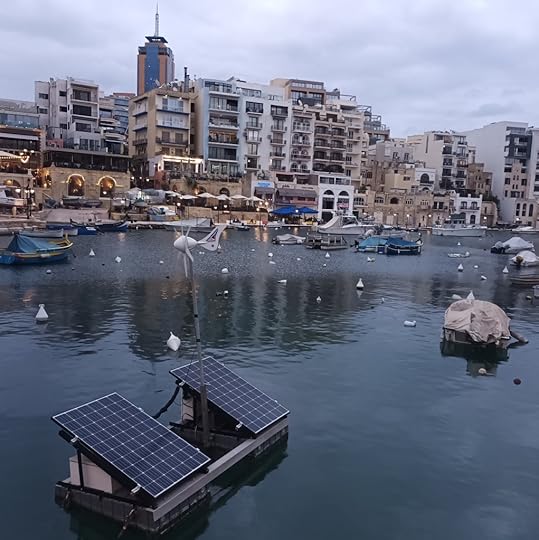
The rocky enclosures are just the kind of spaces I would dream about when I’d head down to lunch break at Ħamrun Liceo; a place where I eventually did find friends but whose long stretches were defined with simply wanting to be elsewhere and assuming this was normal.
Shaping yourself into someone who tolerates life means negotiating the space between the physical and the non-physical, and when you’re raised by parents too scattered and frayed on their own end to offer a ballast or groundwork beyond the most rudimentary, your grasp of the non-physical is equally all over the place.
This is also the same absurd space where Bryan Adams hit anthems co-exist with the news of the Battle of Vukovar, that hum which cannot shape itself into anything coherent, let alone stone.
So, home. Malta became home. We were ‘third-country nationals’ for the longest time and then, one day in 2012, we weren’t any more. A couple of years after my mother had a stroke that would land her in a coma for a decade, we were finally mailed that much-desired olive branch: citizenship.
My father, brother and I went to the office and read out a declaration and signed a paper. The burly policewoman behind the heaving-with-documents desk pointed to another small but significant feature: a crucifix. “Catholic?” she asked us, and when we nodded no she made no fuss about it and just made us read the secular take on all this – said declaration that we would loyal to the Maltese state and respect its institutions and blablabla – and that was that.
We went back home after that, what for both my parents remained a forever home owing to their premature deaths, and what in any case for us was the longest-running home we’d known by then.
3A, Panorama Flats in Sliema. It was something of a purgatorial wreck by that point, owing my mum’s long sojourn in hospital, and then a care home from 2010 to 2020. As us kids trickled out bit by bit, my father would eventually rebrand it into a workshop space-cum-artist commune.
But in that crucial moment in 2012, it was still something of a gutted mess: we were living like roommates – as my father would take pride in saying, sloughing off any leftover parental responsibility he may have still felt beholden to – hypnotised by the puzzling absurdity of our present situation.
My mother was a beautiful, creative young woman who was holding a bunch of stuff together, and her presence in the home – this apartment, the likes of which they don’t make anymore – was a huge part of that: from its inspired decor, down to her expert hand at entertaining a varied panoply of guests, mostly culled from what would pass for something resembling a bohemian strain to Malta’s doggedly provincial social scene.
After she was gone, there was a period when the house simply took on a life of its own – where our respective rooms became cocoons and we would barely cross each other’s paths because making excuses to not confront the core realities of it all was what we’ve been taught. Our parents always gave us the impression that life was simply TOO MUCH – that there was always too much to do, that we were always too broke, that they were always too tired and too stressed for us to be adding to any of that with our own problems.
So I began to view the parties they would organise in the same way that they would – a reprieve from the inevitable, native stress that resided in all our hearts – and which subsequently exploded their own – and we could join in because, after all, we were all just roommates, right?

The permutation of Panorama into a new space for more roommates speaks to my father’s inability to move on from the ingrained idea that this apartment would be the only forever home he would allow himself, despite the residue of all the ghosts it still contained – the same ghosts he never had the gumption to confront with any real sense of finality and articulation. Speaking to one of the roommates who would subsequently populate the space – this one in particular residing for a while in what used to be my room – revealed the extent of this: “Cleaning that place to the end was impossible. There was always some rot, some mould that just wouldn’t go away.”
Apply all of the psychological cliches you can think of here: a man loses his wife and cannot muster the strength or courage to get up off his ass and leave the home they built together, and after his kids fly the coop he populates it with new kids so as to be able to exist in a version of the same patterns he was used to and thus, keep the inevitable at bay.
This is why I feel drawn to a darkened catacomb as a culmination of everything. This is the emotional legacy I’m labouring under, if we are to passively accept that we all become our parents and simply follow in their footsteps.
The fact is, however, that home is not a static object. My mother reaching out to me in the bunk bed and telling me “we’re gonna go find dad” meant that we were leaving a home to find a more permanent one – one in which the cavity of my father’s absence was no longer felt.
This emotional space is slippery and prone to unfortunate dependencies. You rely on your parents, for example, to continue carving out that space of security for you, but my own were never really able to do that, so what was left for me was my own headspace – the generous reading: ‘Mind Palace’ – where I had a degree of control and I could craft things my way, but whose particulars also inevitably pulled from existing surroundings.
The danger lies in getting tired. If you’re tired you’re more prone to lie down, and to lie down you need a solid surface that will accommodate you. So this is why you craft the idea of home as a solid space to return to and just lie down in. But without a sense of cultivation, when all that’s left is rot, home becomes a prison.
Working through this, I suppose the grandiose take is that it’s all about forward motion and sudden death. Moving from one place to a better one and then being drained my life so that you’re felled in the same spot in which you’ve tried to make a home.
When you’re felled, you’re alone. And you either die there or you achieve genuine rest.
Soon after we got our citizenship, I took advantage of my newfound privilege as a European citizen to cross a fraction of the continent on my own steam – taking a three-week trip across London, Edinburgh, Prague and Berlin.
When I came back to Malta, it was September and despite the heat, I decided to go on a solo hike up north. I failed to adequately follow a walking tour guide offered by the Malta Tourism Authority – my map-dyslexia is maddeningly legendary – and ended up prolonging my journey to a ridiculous degree.
But trekking along Dingli Cliffs while listening to Popol Vuh’s soundtrack to Werner Herzog’s ‘Nosferatu’ was transformative. The heat was of course doing my head in, quite literally in many ways, but I didn’t care.
The strumming sitar sound, the yellow stones and the occasional abandoned shrine to the Madonna. Increasingly irrational, but it was a communion with the space that I hadn’t really felt before or since.
What we talk about when we talk about home – Part 3
Read Part 1 here. Read Part 2 here.
The space of loneliness is of course different from that of solitude – with the latter assuming the mantle of the heightened position, the zen-like placid calm and an easy self-communion – but when you’re a kid and experimenting with the things that make you feel good and ease the pain you don’t yet have the layers of experience, of trial-and-error to really make the distinction.
I’ve spoken a lot about the in-the-moment dynamics of displacement and migration here, and loneliness – crucially, not solitude – was a big part of it for me from the beginning since there was very little to latch onto or even land on.
This is what I’ve always found funny about Malta. That the rock is totally a rock. Its undeniable state as an island predominantly defined by rock and STONE – largely the flaky-soft limestone, but still. Famous for it Neolithic temples and famous for all the subsequent temples that followed – one church for each day of the year, St John’s Co-Cathedral and Ta’ Pinu Basilica and all the rest of it. The winding country roads defined by handmade cobbled walls – precarious as they are ubiquitous, a trademark to be protected and which will determine the island’s definition for what feels like forever.
And even down underground, from the paleo-christian catacombs that snake their way across the north, the old water cisterns now fit for dark-tourism-lite tours and boutique concerts, and of course the Hypogeum: now barely reachable by the masses keen to visit all year round because the tickets prices have shot up just like everyone else…
So many perfect enclaves. So many stone spaces to snuggle up against. For shelter, for reflection… to count each crack and each pock-mark, if you like. To be guided by flaming torchlight down subterranean a subterranean passageway and then, reach a clearing and drop it down to the humid floor, and what follows will either be a period of meditation or its longest culmination – death.
But it doesn’t happen that way, does it? Instead of the earthy, enveloping powder of the pure stones by day and its chiaroscuro promises as the sun goes down, the island actually fights against itself and becomes louder and louder – taking the advice to rage against the dying light just that little bit too literally to tip it all over and ruin any remaining chance of peace.

The rocky enclosures are just the kind of spaces I would dream about when I’d head down to lunch break at Ħamrun Liceo; a place where I eventually did find friends but whose long stretches were defined with simply wanting to be elsewhere and assuming this was normal.
Shaping yourself into someone who tolerates life means negotiating the space between the physical and the non-physical, and when you’re raised by parents too scattered and frayed on their own end to offer a ballast or groundwork beyond the most rudimentary, your grasp of the non-physical is equally all over the place.
This is also the same absurd space where Bryan Adams hit anthems co-exist with the news of the Battle of Vukovar, that hum which cannot shape itself into anything coherent, let alone stone.
So, home. Malta became home. We were ‘third-country nationals’ for the longest time and then, one day in 2012, we weren’t any more. A couple of years after my mother had a stroke that would land her in a coma for a decade, we were finally mailed that much-desired olive branch: citizenship.
My father, brother and I went to the office and read out a declaration and signed a paper. The burly policewoman behind the heaving-with-documents desk pointed to another small but significant feature: a crucifix. “Catholic?” she asked us, and when we nodded no she made no fuss about it and just made us read the secular take on all this – said declaration that we would loyal to the Maltese state and respect its institutions and blablabla – and that was that.
We went back home after that, what for both my parents remained a forever home owing to their premature deaths, and what in any case for us was the longest-running home we’d known by then.
3A, Panorama Flats in Sliema. It was something of a purgatorial wreck by that point, owing my mum’s long sojourn in hospital, and then a care home from 2010 to 2020. As us kids trickled out bit by bit, my father would eventually rebrand it into a workshop space-cum-artist commune.
But in that crucial moment in 2012, it was still something of a gutted mess: we were living like roommates – as my father would take pride in saying, sloughing off any leftover parental responsibility he may have still felt beholden to – hypnotised by the puzzling absurdity of our present situation.
My mother was a beautiful, creative young woman who was holding a bunch of stuff together, and her presence in the home – this apartment, the likes of which they don’t make anymore – was a huge part of that: from its inspired decor, down to her expert hand at entertaining a varied panoply of guests, mostly culled from what would pass for something resembling a bohemian strain to Malta’s doggedly provincial social scene.
After she was gone, there was a period when the house simply took on a life of its own – where our respective rooms became cocoons and we would barely cross each other’s paths because making excuses to not confront the core realities of it all was what we’ve been taught. Our parents always gave us the impression that life was simply TOO MUCH – that there was always too much to do, that we were always too broke, that they were always too tired and too stressed for us to be adding to any of that with our own problems.
So I began to view the parties they would organise in the same way that they would – a reprieve from the inevitable, native stress that resided in all our hearts – and which subsequently exploded their own – and we could join in because, after all, we were all just roommates, right?

The permutation of Panorama into a new space for more roommates speaks to my father’s inability to move on from the ingrained idea that this apartment would be the only forever home he would allow himself, despite the residue of all the ghosts it still contained – the same ghosts he never had the gumption to confront with any real sense of finality and articulation. Speaking to one of the roommates who would subsequently populate the space – this one in particular residing for a while in what used to be my room – revealed the extent of this: “Cleaning that place to the end was impossible. There was always some rot, some mould that just wouldn’t go away.”
Apply all of the psychological cliches you can think of here: a man loses his wife and cannot muster the strength or courage to get up off his ass and leave the home they built together, and after his kids fly the coop he populates it with new kids so as to be able to exist in a version of the same patterns he was used to and thus, keep the inevitable at bay.
This is why I feel drawn to a darkened catacomb as a culmination of everything. This is the emotional legacy I’m labouring under, if we are to passively accept that we all become our parents and simply follow in their footsteps.
The fact is, however, that home is not a static object. My mother reaching out to me in the bunk bed and telling me “we’re gonna go find dad” meant that we were leaving a home to find a more permanent one – one in which the cavity of my father’s absence was no longer felt.
This emotional space is slippery and prone to unfortunate dependencies. You rely on your parents, for example, to continue carving out that space of security for you, but my own were never really able to do that, so what was left for me was my own headspace – the generous reading: ‘Mind Palace’ – where I had a degree of control and I could craft things my way, but whose particulars also inevitably pulled from existing surroundings.
The danger lies in getting tired. If you’re tired you’re more prone to lie down, and to lie down you need a solid surface that will accommodate you. So this is why you craft the idea of home as a solid space to return to and just lie down in. But without a sense of cultivation, when all that’s left is rot, home becomes a prison.
Working through this, I suppose the grandiose take is that it’s all about forward motion and sudden death. Moving from one place to a better one and then being drained my life so that you’re felled in the same spot in which you’ve tried to make a home.
When you’re felled, you’re alone. And you either die there or you achieve genuine rest.
Soon after we got our citizenship, I took advantage of my newfound privilege as a European citizen to cross a fraction of the continent on my own steam – taking a three-week trip across London, Edinburgh, Prague and Berlin.
When I came back to Malta, it was September and despite the heat, I decided to go on a solo hike up north. I failed to adequately follow a walking tour guide offered by the Malta Tourism Authority – my map-dyslexia is maddeningly legendary – and ended up prolonging my journey to a ridiculous degree.
But trekking along Dingli Cliffs while listening to Popol Vuh’s soundtrack to Werner Herzog’s ‘Nosferatu’ was transformative. The heat was of course doing my head in, quite literally in many ways, but I didn’t care.
The strumming sitar sound, the yellow stones and the occasional abandoned shrine to the Madonna. Increasingly irrational, but it was a communion with the space that I hadn’t really felt before or since.
Ends.
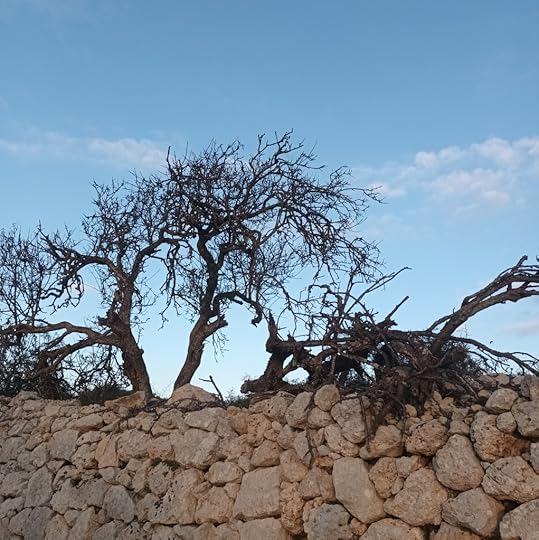
February 17, 2025
What we talk about when we talk about home – Part 2
Read Part 1 here
Both my parents are now dead, and of course I have plenty of regrets and unasked questions which will forever remain pending in a rotting pigeon-box; snuck in but unopened, and I’ll soon forget the actual articulation of these questions and everything will join the same ghostly realm of the nostalgic miasma that I’m straining to pin down and describe here.
As we’ve said – time moves forward, and this forward motion also implies the scalding away of the bodies of those who gave you life and who – inadvertently or otherwise – shaped your social and emotional expectations. But these expectations are never perfect, and often in fact emerge from a build-up of keen and unique damage: unprocessed and even barely addressed.
You know all this. We know all this. But the forward churn of time often leaves these scars lodged into our bodies while we’re forced to tend to other, fresh ones. To put out new fires while older ones are still raging, though some may be reduced to a slow, keen sputter that has morphed into a fireplace of sorts.
I’m overreaching with these metaphors, maybe. I’m just sculpting verbal play from immediate impressions, in the hopes that it would yield something useful. But in the end, isn’t that what all writing is? Isn’t that what the essay form is in particular – to assay, to try, to learn as you go along.
Besides, I like the old-flames-as-new-fireplace metaphor. I think it speaks to the tendency of ‘legacy-trauma’ becoming a default state. Something to return to. A toxic form of comfort. Stories we tell to root ourselves into a sense of coherence, if nothing else.
One of these fireside conversations could concern the details of my father’s time in Libya. He was there around 1991 and 1992 – it had to be around the first half of that time period because by July of 1992 we had already ‘settled’ into Malta with the same provisional air that would inform pretty much everything else we would do as a family.
He was meant to work at the drydocks there, but that plan obviously did not work out because we ended up starting a new life in Malta instead. (There would’ve been something divinely ironic though, wouldn’t there, in going from one country with an authoritarian wartime crisis that devolved into civil war, only to find ourselves in another further down the line).
The fireside story is that he was given a reprieve from whatever hands-on work he was expected to do and he was sent to ‘deliver documents’ to people in Malta. He never got too specific about either. And I never really felt the need to ask, for some strange reason. It’s not so much that I feared the answer would yield something suspicious or unsavory. It’s just that at the time, I took his word for it. I guess we all did. It’s just the kind of thing you allow dads, I suppose, because you want to submit to that imperative – to believe they are the ones providing you with that stable bedrock from which all other meaning emerges and grows.
The fireside story isn’t so much about what he did and didn’t do there, exactly. For that, I suppose there’s both the prosaic and the spurious – if not romantic – interpretations available to us to bandy about.
He could’ve just decided it wasn’t for him – any by extension, per the aforementioned patriarchal imperative, not for us – and that he made a judgement call and opted for the post-colonially wrecked but pretty Mediterranean island instead. Then we could of course run riot with the poundshop espionage narratives, the lurid conspiracy theories: ‘delivering documents’ from Libya to Malta at the peak of the Gaddafi regime? Juicy. Le Carre worthy. Even ‘sus’.
(Later, much later, as my brother and I would bond over his many faults and wounds after his death, he’d offer a plausible stitch to the story: our artsy father was ‘useless at actual construction work’ and so his uncle found some use for him as an messenger boy).
But funnily enough, the fireside story doesn’t amount to a culmination of any of the above. It concerns an even more finely-tuned and concise piece of storytelling. One that frames our tale of settling into Malta as both sanguine and inevitable.
“My dad went to work in Libya, he didn’t really like it, so he took a Captain Morgan boat to Malta to scope out the island and once there he said, this is good – we’ll settle here.”
An elevator pitch. Free of needless detail and complication. Emboldened with pure immigrant pluck, and animated by hope.
Just like we never questioned the details of my father’s time in Libya, so my family never picked all that much at the thorny matter of the Yugoslav Wars, at least not in any incantatory way that would cohere a united front – those micro-political stances some families do take on major issues like these. It’s not that the subject was taboo – my parents spoke about it among themselves in our presence, openly discussing it with fellow Yugo-expats while trying to condense it into bite-sized chunks for Maltese acquaintances – but there was a sense in which talking about it at length with the kids meant infecting the family with its oozing ugliness.
There were some tableside scraps of the narrative which were easy to internalise, though: such as the prevailing thought that the very premise of the war was absurd, that the internecine divisions which characterise it were arbitrary and that nationalistic impulses in whichever direction were enabled by a lumpen mass of the uneducated.
But on a day-to-day level, the war only registered in the undeniable fact of our displacement, and our ongoing distance from the home country as it all raged at its worst and sanctions still barred us from traveling.
So that we lived in that absurdist limbo state where Bryan Adams’s ‘Everything I Do (I Do it for You)’ – ubiquitous as the equally incorrigible camp-fest that was Robin Hood: Price of Thieves to which it was wended as the banner theme song – edged itself into our lives in a more significant way than the contemporaneous Battle of Vukovar never could. Similarly, when we finally got to return to Serbia in 1996, the main emotional undercurrent was that we got to introduce my sister – born a year prior – to our grandparents… us kids were oblivious to the fact that the Dayton Agreement is really what made the trip possible.
‘The war’ was just a perpetual hum in the background of our lives: an undeniable state whose particulars, however, were always remote for us in the immediate sense.
I suppose this is the privilege of those like us who made their way out. (Not to mention the position of Serbia in particular, when it came to its role in the conflict itself).
But there are so many remainders and loose ends. No real narratives, only impressions. And I suppose that, when it comes to war, this is all for the better: we know that concrete narratives in these scenarios often breed monstrous things.
But for a child, the space of silence is rarely a cocoon for meditation. More often than not, it becomes an incubator for loneliness.
Continues…
Photo by Zvezdan Reljić
February 14, 2025
What we talk about when we talk about home – Part 1
Is there a standard expectation of when our earliest memory is expected to be? The image I have in mind feels a bit late in the day – I was six or seven years old – but I can’t grasp for anything earlier with any conviction and anyway, the further down you go the risk of low-key hallucination – our own personal storehouse of fiction – increases exponentially.
We left Serbia for Malta when I was seven years old, and we spent some days in Bulgaria en route to the island, because wartime sanctions meant we couldn’t fly out directly and had to make a pitstop to Sofia, taking a train ride from Belgrade and sleeping over at the home of acquaintances I hadn’t heard about before or since.
I do remember parts of Sofia – a large, Communist-style statue of a male figure seeping through the urban sprawl, a vegetable market, the brutalist buildings that weren’t all that different from Belgrade – and I remember the train ride too: though the sequence and the images aren’t that clear, my maternal grandmother’s sorrow and confusion still lands like a fresh arrow.
But these weren’t the very first memories – hazy and ancient though they feel too, like watching a grainy film of somebody else’s life, lost in archival wreckage and only just about salvagable, albeit in fragmented form.
The first memory was a foreshortened view of my mother – stylishly dressed as she always was, but definitely dressed to go out, with a coat and a hat and everything, and a wide, warm smile that was to become an aching pull of charm to whoever would meet her.
“We’re going to go find dad.”
She was foreshortened because I was sleeping on the top bunk of our bed in Zemun, with my four-year-old brother on the lower one. The mood of her smile suddenly matched my own – it spread out to me like an infectious carrier of pure joy.
Finding dad was the one thing I wanted. The one thing I felt was missing. The wistfulness for him that had become my norm by then was finally going to find its culmination, was finally going to be allowed to die a natural death.
So that I could become me, in whatever was left.
Dad wasn’t around for a bit because before the Malta plan, there was the Libya plan. The creep of the Yugoslav Wars – that one blip in the otherwise end-of-history-ish vibe that permeated the West during the ’90s – had nudged our parents into considering other options.
And the one that made itself readily available was this one: my father would go to work for his uncle at the drydocks of Benghazi, and the first stage of that was an exploratory trip away from us for some months.
The surge of instant gladness I still remember feeling the moment my mother smiled up at me to say we’re going to find dad means that I had felt his absence like the undeniable cavity of a freshly pulled out tooth.
There’s something that invokes self-pity in the idea that a lack was a main characteristic of my psychic development at that time, but there’s also a positive flip-side to this early memory being tinged with relief and expectation. It’s also a confirmation of the kind of bond you develop with a parent so early on – they really are at the center of your world, so their absence feels, at the very least, like a key comfort denied.
Now my parents are both dead. What to do when that absence becomes not just deferred, but extended indefinitely?
The more time passes, the more I realise just how much of that initial childish separation from my father conditioned my emotional space.
It made me all the more keenly susceptible to nostalgia, to the point where people would make fun of me for wallowing in it at such a young age. (“You’re seventeen, what could you possibly be nostalgic about?”).
Because my parents were either incapable, or unwilling, to internalise the value of sitting still. Displaced from Serbia, we moved within Malta too, just about enough to fully rattle my young psyche into believing that I’ll never find a true sense of home. It’ll surprise precisely no-one that the upshot of this was a dovetailing into fantasy by default.
During break-time at at school, I was magnetically drawn towards the areas of the playground market ‘out of bounds’ – signs virtually unenforced by whatever passed for gatekeeping authorities – lax at the best of times – and which were certainly not going to clamp down on the gawky, floppy-haired nerd who did little except munch of a soggy sandwich and stare into space.
Nostalgia and fantasy walk hand in hand. This is why nostalgia is more than just dry record or a verifiable memory. This is why it comes with a charge of desire and wistfulness, and consequently also why it tends to be viewed with suspicion. Unhealthy, neurotic, escapist and regressive. Putting people inside hamster-cage loops of the past that are both ghostly and undeniable.
This is all well and good. It is the rational position to take. It is the sober and constructive approach that discourages needless and ultimately damaging wallowing. Being lost in the past means being placed in a state of arrested development. Nostalgia means being plunged back into the past, but time as we live it moves forward, and a lot of our psychic success hinges on at least meeting it halfway.
But that implies that a ground of some kind exists. A home base – indeed, a home, period.
But what if your home never quite materialised? And what if this tenuous home is a rock in the middle of the sea that is constantly made to evolve according to the whims of its colonising forces – both imperial and capitalist?
Continues…
Photo by Virginia Monteforte
January 29, 2025
Perfunctory Epic: The Rings of Power, Season 2 (Amazon Prime)
DISCLAIMER: Here be spoilers.
Like most nerds of my generation – lapsed or otherwise and to varying degrees of commitment and intensity – I cling hard to the pure memories of my earliest viewings of Peter Jackson’s The Lord of the Rings trilogy.
While the books weren’t childhood favourites – I was knee-deep in Marvel comics up until my early teens – I did bone up on them while the films were still in the early stages of pre-production, goaded on by another close friend who would move back to Canada with his family before we would get a chance to see them in the Maltese cinemas together.
But there were other friends who would’ve filled the gap in the meantime, some of whom I was, by this point, playing Dungeons and Dragons with.
So in my mind, this period now forms a mash-up of time where a store of fantasy imagery was taking root in my ‘mind palace’, which would serve as a source of comfort and self-identification for years to come… in many ways it still serves that function to this very day, albeit in somewhat altered form.
I’m thinking about all of this after finally having caught up with the second season of The Rings of Power – Amazon Prime’s bid to secure their own Game of Thrones franchise by pre-committing to five seasons of the thing and even launching a reserve long-form adaptation in the form of The Wheel of Time should this one go bust.
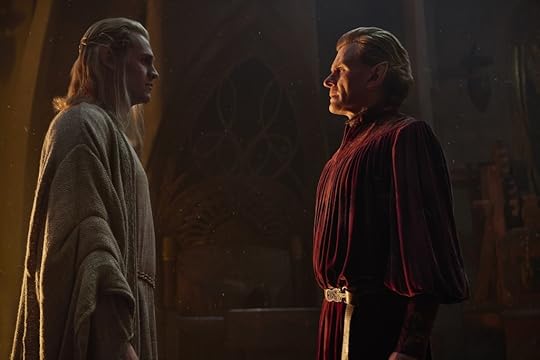 Charlie Vickers as Sauron
and Charles Edwards as Celebrimbor
Charlie Vickers as Sauron
and Charles Edwards as Celebrimbor This cynicism seeps through the operation and, unfortunately, I feel it’s particularly evident in this second season, which toggles in a perfunctory fashion from one of the many sub-plots to another, the only real connective tissue being the long-game machinations of Sauron (Charlie Vickers): here a svelte Machiavellian figure whose Season One disguise as sea-faring lone wolf ‘Halbrand’ pulled the wool under the eyes of none other than Galadriel (Morfydd Clark) herself.
(In Halbrand-mode, he could’ve easily fronted one of those neo-Britpop acts… there’s something disarming in the image of Galadriel bopping to Kasabian.)
The thing is, I was quite chill about The Rings of Power when it first appeared. Unlike many others, apparently, I was willing to give Season One a chance, with its slow burn and trickle of ‘new’ characters and fill-in-the-blanks exercises riffing on the sketches of lore the showrunners and their writers had to work with.
It felt, at the very least, the start of something that could grow into an organic story with its own heartbeat… and Galadriel-as-fundamentalist struck me as a bold-enough narrative choice which, I suspected, would yield some interesting detours further down the pike.
But, hand on heart, I can’t quite say that the second season is exactly rewarding my investment on this front. Where we previously had a gorgeously photographed and put together spark of potential, now we have that, only with the potential snuffed out in favour of a flattening and overstretched story that is really just a set of fan-fictiony vignettes ticking off boxes, all scattered across disparate geographical locations on Tolkien’s famously vast and detailed map of Middle Earth.
It’s yet another reminder of how the magic we associate with fantasy literature in particular – that thrill of immersion all too often written off as simply ‘escapist’ – has very little to do with by-the-numbers tropes and settings and everything to with an innate poetry that speaks to a wider yearning.
The yearning for a world which is more mysterious and more alive, where traveling means discovery, danger and difference and where transcendence can be mapped out and understood but never replicated in rote human terms.
But replication is so ingrained in pop culture now. In a sense, it is its only real faith. The belief that for something to work – for something to even be conceived – it needs to have worked before, and on a massive scale.
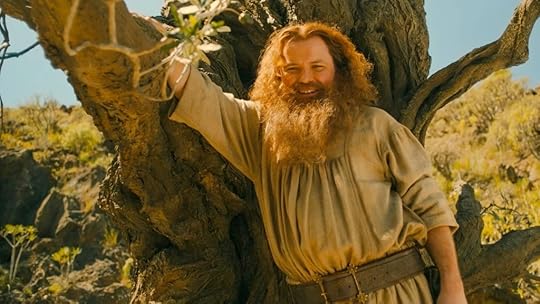 Rory Kinnear as Tom Bombadil
Rory Kinnear as Tom BombadilYou can of course imagine that such an approach doesn’t do too well when attempting the kind of fay whimsy that is very much part of Tolkien’s fictional universe, no matter what the more macho strands of the fandom would have you believe.
It’s why the sequences with not-(yet)Gandalf and his duo of not-Hobbit buddies are the dullest in the show, and why Rory Kinnear’s Tom Bombadil, while certainly a welcome presence on screen after being infamously excised from the Jackson trilogy, feels just like another placeholder mentor figure – a wizard whose only USP is a higher quotient of chill than his counterparts – instead of a baffling and refreshingly unexplained spirit of sylvan inevitability.
Perhaps this is why The Rings of Power is at its best when zooming in on still-human-shaped Sauron and his horrifically ingenious acts of arts-and-crafts based gaslighting. Let’s face it, it’s the all-too-human cruelties on lurid display that helped Game of Thrones nab a healthy swathe of the non-nerd audience, because this is stuff that soap operas are made of and as long as we want power, sex and exist among people who desire the same, the electric charge of it will never cease to appeal.
So it’s clear that the showrunners are confident in their abilities to tighten the noose around poor Celebrimbor(Charles Edwards)’s neck, as Sauron – disguised as the outwardly benign jewellery savant Annatar – makes good on his moniker as the Great Deceiver, and how.
For all that the show is littered with instances of orcs, giant spiders and other gory creatures whose mere presence is meant to trigger our gag reflex, none of them can hold a candle to the gross yet precise – precisely so gross because it’s so precise – way in which Sauron ingratiates himself into Celebrimbor’s workshop (really, the seat of this craftsman-monarch’s very kingdom). I don’t remember feeling this disgusted by a TV character since the John Paul (aka ‘The Prick’) from the first season of Bad Sisters.
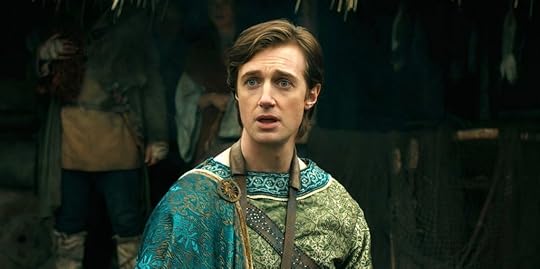 Leon Wadham as Kemen
Leon Wadham as KemenThis is just about the only instance of genuine emotional frisson we’re allowed to feel during the season, where we’re allowed to wince and hiss at displays of moral callousness because how else are we gonna react? Same goes Kemen (Leon Wadham), the PG-13 Joffrey of the show: nepo-baby son to the scheming aspirant to the Númenórean throne and the custodian of the most smoothly slappable faces this side of Westernesse. (Thankfully, it’s a face that *does* get slapped once or twice already, though we’re meant to understand that his true comeuppance is yet to come and given how padded out the show is, this’ll be a case of delayed gratification for the Ages).
But there’s an elevated flip-side to all this. Namely, that Celebrimbor’s rise and fall constitutes a decent stab at a Greek-style tragedy. But this is the kind of stuff we’ve internalised a long time ago and now keep regurgitating with ease… and arguably, the real lasting value of Tolkien’s work lies in how he decided to side-step the otherwise ubiquitous Hellenic legacy in favour of the knottier and gnarlier brambles of Beowulf and the Norse Sagas.
Of course, you can never go home. (This is true of the denizens of Eregion in more ways than one, after Sauron’s done with them). Nobody’s asking a new show to try and rekindle the same magic we felt when we first read The Lord of the Rings or watched the Peter Jackson adaptations. (And if they are, they really should reconsider what they expect from their pop culture artifacts.)
My suggestion? Pick up The King of Elfland’s Daughter by Lord Dunsany. It’s a good deal shorter than both The Lord of the Rings – slimmer than any of its three books, actually – and you’ll likely work through it even quicker than you would sitting through this latest season of That Second Age Show.
It’s the kind of book that Tom Bombadil would’ve written, because Bombadil understands the world and its denizens better than they understand themselves, and can sing a story that still remains a song.
